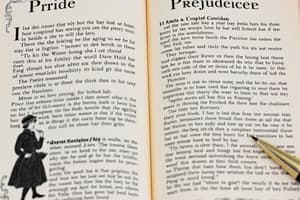Podcast
Questions and Answers
What does the term 'bathos' refer to?
What does the term 'bathos' refer to?
A literary term describing something with deep emotional meaning.
What is meant by 'centre of consciousness' in narration?
What is meant by 'centre of consciousness' in narration?
- A method describing the flow of thoughts in a character's mind. (correct)
- A technique for revealing the author's thoughts.
- A perspective that omits characters entirely.
- A method focusing on multiple characters' thoughts.
What is an aphorism?
What is an aphorism?
A concise statement of truth or opinion.
The quote 'It is a truth universally acknowledged...' is an example of irony.
The quote 'It is a truth universally acknowledged...' is an example of irony.
What does visual imagery reveal about Elizabeth and Darcy?
What does visual imagery reveal about Elizabeth and Darcy?
How do journeys function in 'Pride and Prejudice'?
How do journeys function in 'Pride and Prejudice'?
What do windows symbolize in the novel?
What do windows symbolize in the novel?
What does the militia represent?
What does the militia represent?
What do eyes symbolize in 'Pride and Prejudice'?
What do eyes symbolize in 'Pride and Prejudice'?
What role do letters play in 'Pride and Prejudice'?
What role do letters play in 'Pride and Prejudice'?
What does Lydia's letter to Elizabeth reveal?
What does Lydia's letter to Elizabeth reveal?
What does Darcy's letter to Elizabeth communicate?
What does Darcy's letter to Elizabeth communicate?
What does the letter from Mrs. Gardiner symbolize for Elizabeth?
What does the letter from Mrs. Gardiner symbolize for Elizabeth?
What does Miss de Bourgh symbolize in the novel?
What does Miss de Bourgh symbolize in the novel?
What do books symbolize in 'Pride and Prejudice'?
What do books symbolize in 'Pride and Prejudice'?
What does Lydia's ring represent?
What does Lydia's ring represent?
What does the male gaze signify in the narrative?
What does the male gaze signify in the narrative?
What is the significance of symmetry in the novel?
What is the significance of symmetry in the novel?
What does Pemberley symbolize?
What does Pemberley symbolize?
What does dancing symbolize in the story?
What does dancing symbolize in the story?
What do the outdoors symbolize?
What do the outdoors symbolize?
What do the Bennet women's property rights represent?
What do the Bennet women's property rights represent?
What does Elizabeth's walk to Netherfield signify?
What does Elizabeth's walk to Netherfield signify?
What does the term 'Fallen Woman' refer to?
What does the term 'Fallen Woman' refer to?
Flashcards are hidden until you start studying
Study Notes
Literary Terms and Concepts
- Bathos: A term from Greek meaning "depth"; used in literature to convey deep emotional significance.
- Centre of Consciousness: A narrative method focusing on a character's thoughts; Elizabeth Bennet serves as the primary focus for readers in "Pride and Prejudice."
- Aphorism: Concise statements of truth or opinion; exemplified by the famous opening line regarding wealthy single men and marriage.
- Irony: Notable in the statement about single men and marriage, highlighting societal dependency of women on men during the late 18th century.
Symbols and Motifs
- Visual Imagery: Faces of characters, especially Elizabeth and Darcy, express intense emotions and reveal their feelings for each other.
- Journeys: Predominantly indoor scenes contrasted by journeys that act as catalysts for character transformation, reflecting Darcy's dedication to Elizabeth.
- Windows: Symbolize class divisions; the upper class looks down upon the lower class, representing societal views.
- The Militia: Represents anonymity and allows male characters to pursue status without revealing their true intentions.
Character and Relationships
- Eyes: Symbolize the objectification of women, with Darcy's "pair of fine eyes" expressing his passion for Elizabeth.
- Letters: Essential for plot advancement and character development, revealing personal insights and relationships.
- Lydia's Letter to Elizabeth: Highlights Lydia's focus on wealth, her problematic marriage, and moral decay.
- Darcy's Letter to Elizabeth: A pivotal moment that reveals his feelings and prompts Elizabeth's self-discovery.
- Letter from Mrs. Gardiner: Leads Elizabeth to introspection, generating feelings of uncertainty and understanding.
Class and Society
- Miss de Bourgh: Represents aristocratic inbreeding effects; described as "pale and sickly."
- Books: Indicate intelligence and personality; contrast seen in Mr. Collins' lack of reading.
- Lydia's Ring: Symbolizes social expectations and Lydia's self-worth tied to materialism in marriage.
Gender and Expectations
- The Male Gaze: Celebrates women's beauty through male admiration, particularly in the context of Jane's attractiveness.
- Symmetry: The novel's structure contrasts poor marriages (Mr. and Mrs. Bennet) with successful ones (Darcy and Elizabeth).
- Pemberley: Symbol of Darcy's character; embodies both his genuine nature and arrogance.
- Dancing: Reflects compatibility in relationships, serving as a metaphor for couples’ dynamics.
Setting and Symbolism
- The Outdoors: Represents openness and understanding; best communication between Darcy and Elizabeth occurs in nature.
- Longbourn: Highlights women's lack of property rights, showcasing dependency on men for security.
- Elizabeth's Walk to Netherfield: Challenges societal expectations of female appearance and decorum.
- Fallen Woman: A societal label for women who lose virtue through sexual sin, illustrating the rigid moral standards of the time.
Studying That Suits You
Use AI to generate personalized quizzes and flashcards to suit your learning preferences.




